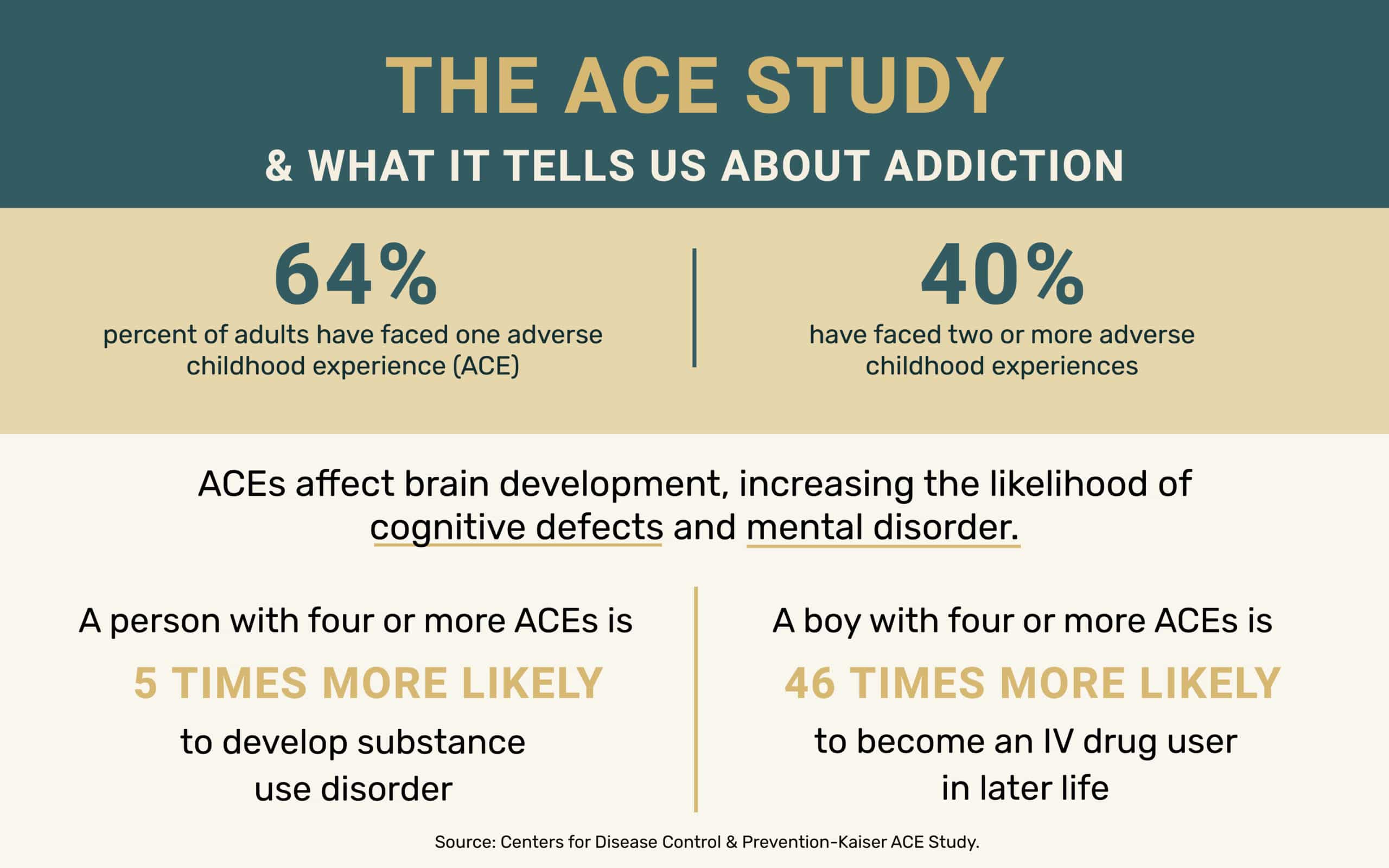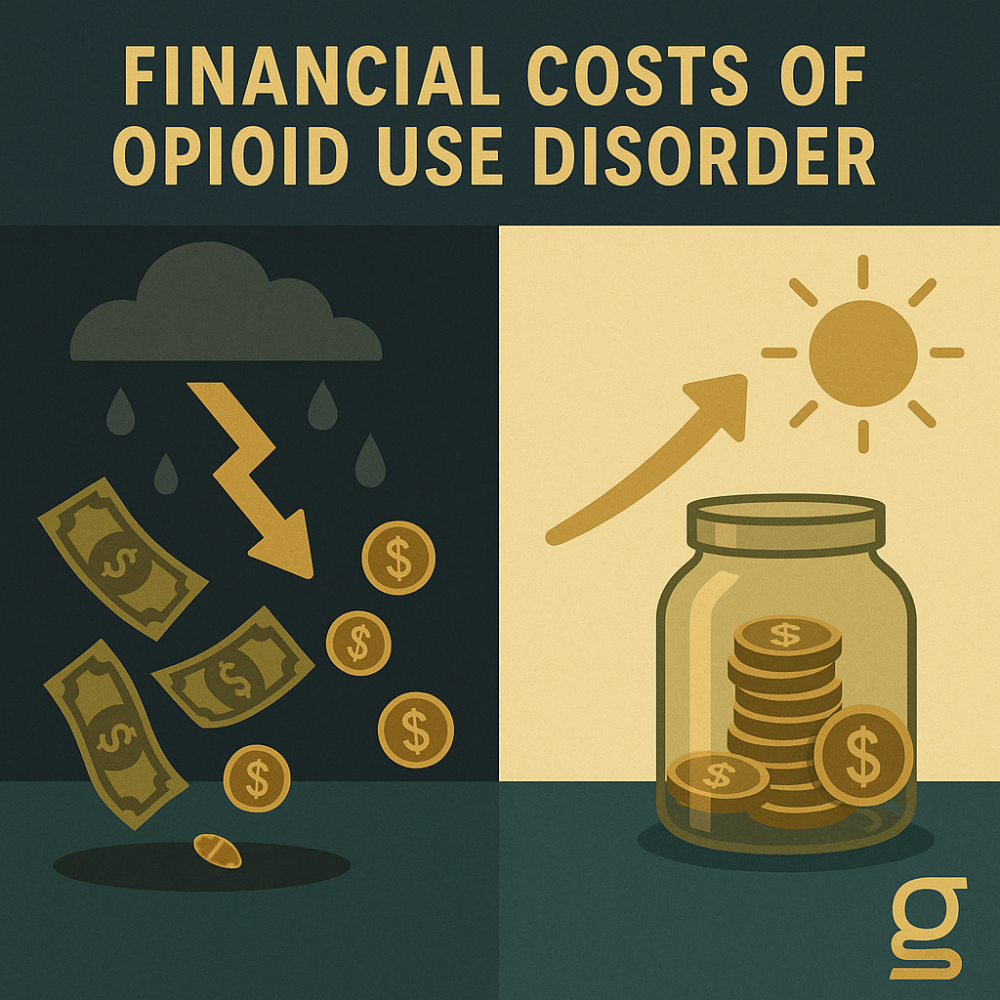Trauma is an epidemic in the United States, as many Americans have faced some form of negative experience in their lifetime, often in their childhood. Trauma has a significant and long-standing impact on people’s emotional and mental well-being. Trauma is now considered to be one of the country’s major public health problems because of the established link between trauma and chronic illness in later life, including substance use disorders.
The ACE Study
The leading study on trauma is the Adverse Childhood Experience Study (the ACE study), conducted by Dr. Vincent Felitti, et al. The study measured the relationship between severe childhood stress and all types of addictions, from substance use disorders to eating disorders. The key types of trauma included neglect, abuse, divorce, losing a parent, and witnessing abuse. The findings showed a clear scientific link between many types of childhood adversity, and the adult onset of physical disease and mental disorders.
The major observations drawn from this study are:
- 64 percent of adults faced one adverse childhood experience (ACE) in their past.
- 40 percent faced two or more.
- ACEs affect the development of the brain in such a way that it can render the person susceptible to cognitive defects and psychiatric illnesses, especially substance use disorder.
- The risk of these outcomes increases with more ACEs.
- A child with six or more ACEs is nearly three times more likely to be a smoker as an adult.
- A child with four or more ACEs is five times more likely to develop substance use disorder and is 60 percent more likely to become obese.
- A boy with four or more ACEs is 46 times more likely to become an IV drug user in later life.
 The study concluded that the type of ACE didn’t matter: it was the cumulative effect of multiple types of stress that drastically increased risks of negative health and well-being in later life.
The study concluded that the type of ACE didn’t matter: it was the cumulative effect of multiple types of stress that drastically increased risks of negative health and well-being in later life.
This is why mental health and substance use disorder providers must be trauma-informed — understanding the relationship between trauma, mental illness, and substance use disorder.
The Link Between Trauma and Addiction
We know there is an established link between trauma and addiction, and between adverse childhood experiences and addiction. Untreated or prolonged and repeated trauma can change the architecture of the brain, especially in children. It can alter the gene expression that controls stress, and trigger an inflammatory response in the body, leading to a cascade of physical and emotional dysregulation. This profound effect on the body can lead to chronic diseases and addiction, as individuals use substances to escape.
“When trauma occurs early in life, an already difficult task is made more challenging. Childhood trauma not only leaves people with increased risk for substance misuse and emotional instability, but also chronic medical problems,” explains Gallus Clinical Director, Steve Carleton.
That is why it is critical that substance use disorder treatment providers screen for trauma and provide trauma-informed practices.
“It is necessary early in treatment for substance misuse to assess for trauma,” says Carleton.
He continues, “Too often, ACEs and other traumas go overlooked. Recent studies and estimates demonstrate that up to 75 percent of people struggling with substance misuse have a trauma history. Substances often are the solution to distressing memories and emotional disturbances. Numbing and avoiding emotional and physical pain with substances is a natural and normal human response. Trauma often goes overlooked because addiction is a much louder problem, and trauma is silent.”
He argues that by shifting our focus to the idea that substance use might be a symptom of trauma, providers and family members alike start to understand. “We need to stop asking, ‘What is wrong with you?’ and instead ask, ‘What happened to you?’” he says.
We can help you heal from trauma.
Contact Us
Treating Trauma
Removing substances that a person has been using to numb their pain can lead to uncovering their trauma wounds. Dealing only with substance use disorder can cause the person to turn back to substances due to the immense dysregulation in their body — manifesting in chronic illness, pain, and/or an inability to process major stressors and overwhelming emotions.
In short, unresolved trauma can become a ticking time bomb. Treating trauma is paramount to sustained recovery and helping reverse its effects on the body’s ability to self-regulate. Just like treatment for substance use disorder, shame can be a major factor in seeking treatment.
“Please join us in the call to reduce stigma and help people to feel more comfortable and less alone. It starts with all of us being willing to listen when people open up about painful, shame-inducing experiences. Let people know that no matter what happens, recovery is possible, and people are here to help and not judge,” says Carleton.
At Gallus Medical Detox, we believe there is dignity in healing. Call us today and take the best first step toward your recovery: (866) 272-5978
_______________________________________________________________________________________________
 More about Steve Carleton:
More about Steve Carleton:
Steve worked in the Department of Veterans Affairs for 10 years. He is a PTSD and Substance Use Disorder expert with over 14 years of experience in and around addiction. Steve is also an Adjunct Professor at the University of Denver’s Graduate School of Social Work. He teaches Cognitive Behavioral Therapies, Motivational Interviewing, and Assessment Skills using DSM-5, amongst others.


 Steve B
Steve B 

 Casey Wilson
Casey Wilson